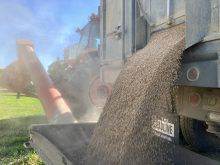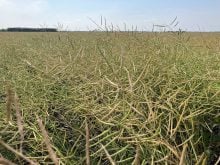Unusually mild temperatures in Western Canada are threatening to damage stored crops, potentially downgrading quality and reducing supply for exports, a canola industry official said Jan. 15.
Canola crushers are noticing shipments of canola with mould and other heat damage, said Jim Bessel, a senior agronomy specialist with the Canola Council of Canada. “Because of the harsh conditions this fall, vigilance is critical right now.”
Warmer weather always raises concerns of mould forming in storage bins, but those fears are greater this year because farmers harvested much of the late crop in damp conditions, Bessel said.
Read Also

Manitoba boosts stake in cereals centre to $23.5 million
Premier Wab Kinew said the additional project funds will help ‘Trump-proof’ the provincial economy.
Mould can drop canola quality drastically, not only removing it from the export supply but making it hard to sell to anyone, he said.
Wet October weather delayed much of Canada’s harvest to November, when farmers moved quickly to get their crops off the field before the first snowfall.
Mild temperatures can cause insect problems for stored grain, said Bruce Burnett, director of weather and market analysis for the Canadian Wheat Board.
“(Farmers) have to keep very close attention to wheat, canola, whatever was put away late and wet,” he said.
With so much of the crop harvested late, farmers were hard pressed to manually dry it. Some wrongly thought that an early cold snap would keep mould from forming.
“As I have said many times, mould grows in the fridge,” he said. “People aren’t being attentive enough.”
Farmers should now be checking their bins and moving the crop if they detect mould, Bessel said.
Temperatures are expected to return below freezing, but as days get longer the sun’s rays become more intense and can still raise temperatures inside bins, Bessel said.














